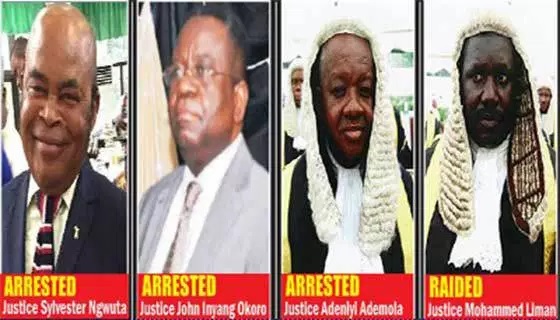
…NJC, DSS trade words
There are indications that the Federal Government may rule out the possibility of plea bargain for the judges arrested and released by the Department of State Service (DSS).
Plea bargain is a system where an accused person admitted to the offence, especially when it relates to financial crime and as such the suspect will return part of the money in question, and hence a lighter sentence will be passed by the court.
The secret service had last Saturday in various parts of the country raided and arrested about seven judges over alleged corruption. The judges involved are Justices Inyang Okoro and Sylvester Ngwuta of the Supreme Court; Adeniyi Ademola of the Federal High Court, Abuja; Kabir Auta of the Kano High Court; Muazu Pindiga of the Gombe High Court, Mohammed Tsamiya of the Court of Appeal in Ilorin, and the Chief Judge of Enugu State, I. A. Umezulike. Justices Umezulike, Auta, and Tsamiya had earlier been recommended for sack by the NJC for alleged corrupt activities.
A source who prefers anonymity because he is not authorised to talk told Saturday Telegraph that the possibility of the plea bargain should be ruled out as far as the judges are concerned.
“The judges will be charged to court any moment from now. We are waiting for the action of the NJC. We expect the NJC to suspend them; otherwise it’s like taking a sitting judge to court.
“In the service, when anybody is being investigated for any serious crime, the first thing we do is to place such a person on suspension. After the investigation, such a person would face trial and get dismissed from service on conviction and later face prosecution in the law court.
“The NJC does not have the luxury not to suspend them. We wrote the NJC on Monday but we haven’t received any response.” Meanwhile, contrary to the expectations of the DSS, the NJC had refused suspend the affected judges, rather it (NJC) said that the secret service could establish a prima facie against them.
The council in a statement issued at the end of its two day emergency meeting in Abuja said that the action of the DSS is a threat to the Independence of the Judiciary, which portends great danger to the nation’s democracy.
The council also described the arrest as a clear attempt by the DSS to humiliate, intimidate, denigrate and cow the Judiciary. However, another source told Saturday Tele-graph that the Federal Government is already working towards setting up a special court to try the judges.
“According to the source, the anti-corruption advisory committee led by Prof. Itsay Sagay is looking at the possibility of a special court to try the judges.” However, speaking on the legality of such court, a constitutional lawyer, Ola Ibiwoye, said it will take a long process for such court to be put in place. “This is because there must be a law that will back up such court as it cannot be a creation of a committee.
To establish such court, it will surely take a long process. “If the Federal Government insists on a special court, it means it will have wait for a long time before arraigning the judges. That will simply defeat the purpose of the arrest,” he added.







No comments:
Post a Comment